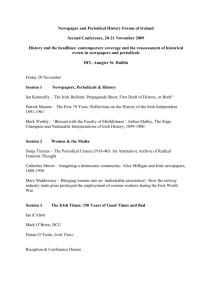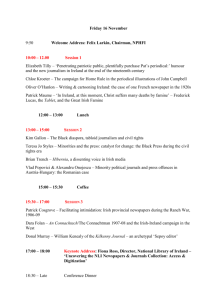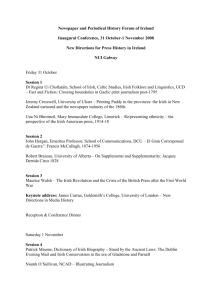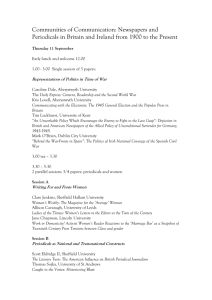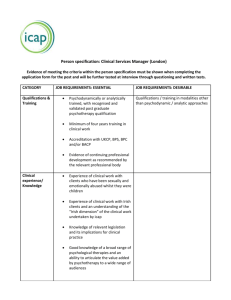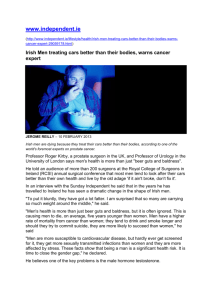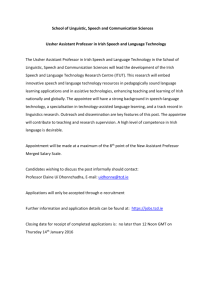Ireland and the New Journalism
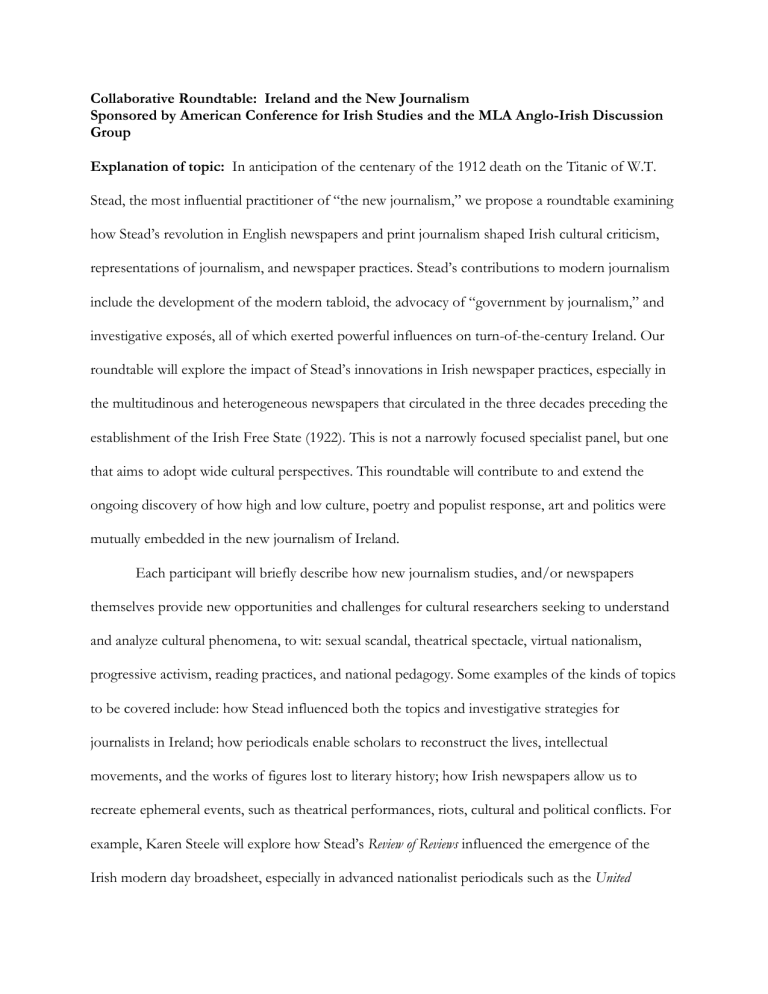
Collaborative Roundtable: Ireland and the New Journalism
Sponsored by American Conference for Irish Studies and the MLA Anglo-Irish Discussion
Group
Explanation of topic: In anticipation of the centenary of the 1912 death on the Titanic of W.T.
Stead, the most influential practitioner of “the new journalism,” we propose a roundtable examining how Stead’s revolution in English newspapers and print journalism shaped Irish cultural criticism, representations of journalism, and newspaper practices. Stead’s contributions to modern journalism include the development of the modern tabloid, the advocacy of “government by journalism,” and investigative exposés, all of which exerted powerful influences on turn-of-the-century Ireland. Our roundtable will explore the impact of Stead’s innovations in Irish newspaper practices, especially in the multitudinous and heterogeneous newspapers that circulated in the three decades preceding the establishment of the Irish Free State (1922). This is not a narrowly focused specialist panel, but one that aims to adopt wide cultural perspectives. This roundtable will contribute to and extend the ongoing discovery of how high and low culture, poetry and populist response, art and politics were mutually embedded in the new journalism of Ireland.
Each participant will briefly describe how new journalism studies, and/or newspapers themselves provide new opportunities and challenges for cultural researchers seeking to understand and analyze cultural phenomena, to wit: sexual scandal, theatrical spectacle, virtual nationalism, progressive activism, reading practices, and national pedagogy. Some examples of the kinds of topics to be covered include: how Stead influenced both the topics and investigative strategies for journalists in Ireland; how periodicals enable scholars to reconstruct the lives, intellectual movements, and the works of figures lost to literary history; how Irish newspapers allow us to recreate ephemeral events, such as theatrical performances, riots, cultural and political conflicts. For example, Karen Steele will explore how Stead’s Review of Reviews influenced the emergence of the
Irish modern day broadsheet, especially in advanced nationalist periodicals such as the United
Irishman and the Irish Worker. Gregory Castle will examine several other advanced nationalist periodicals to illuminate how these texts provided a “political education” for Irish readers and impacted a broad spectrum of Revivalist and nationalist groups, including the physical-force
Republicans who fought in the Easter Rebellion in 1916. Anne Kane will chart how newspapers allow the means by which to reconstruct and analyze ephemeral experiences, such as mass meetings in rural Ireland, through discourse analysis of events (for example, mass meetings) and editorials
(including letters to the editor and weekly pastorals from Catholic bishops). So, too, Paige Reynolds will explore how Irish periodicals assist the cultural researcher in reconstructing spectacles, such as the riots over the staging of Synge’s Playboy of the Western World, or reconstructing lives, such as dramatist Mary Manning, who left no public archive of her writings.
2. Panelists’ and Presiders’ Scholarship.
Our roundtable will include five panelists with expertise in the burgeoning field of Irish periodical studies and the Irish revival:
1) Margot Backus, associate professor of English at the University of Houston, is the author of The
Anglo-Irish Gothic Family Romance (Duke, 1999) and Odd Jobs: James Joyce’s Scandal Work (Notre Dame, forthcoming), which draws extensively on Irish periodicals to investigate and analyze turn-of-thecentury sexual scandals in James Joyce’s ouevre.
2) Gregory Castle, professor of English at Arizona State University, is the author of Modernism and the
Celtic Revival (Cambridge University Press, 2001) and the editor of an anthology of postcolonial theory, Postcolonial Discourses: A Reader (Blackwell, 2001). Castle's forthcoming book (working title:
Inventing Souls: Pedagogies of Irish Revivalism) studies the advanced nationalist press to explore the pedagogical methods and educational theory of nationalist and Revivalist groups.
3) Anne Kane, assistant professor of sociology at the University of Houston-Downtown, is a political sociologist. A recent Fulbright scholar, she has developed a theoretical and methodological framework for studying and understanding the role of newspapers in social transformation in late
19 th -century Ireland.
4) Paige Reynolds, associate professor of English at Holy Cross College, is the author of essays on little magazines in England and Ireland. Her book, Modernism, Drama, and the Audience for Irish Spectacle
(Cambridge 2007) draws extensively on newspapers and other periodicals to reconstruct and analyze early twentieth-century public spectacles and dramatic performances.
5) Karen Steele, professor of English at TCU, is the author of Women, Press, and Politics during the Irish
Revival (Syracuse, 2007) and editor of Maud Gonne’s Irish Nationalist Writings (Irish Academic, 2004).
She focuses on the contributions of women writers in the advanced nationalist press to the Irish literary revival and to the Irish progressive movements of suffrage, trade unionism, and national decolonization.

